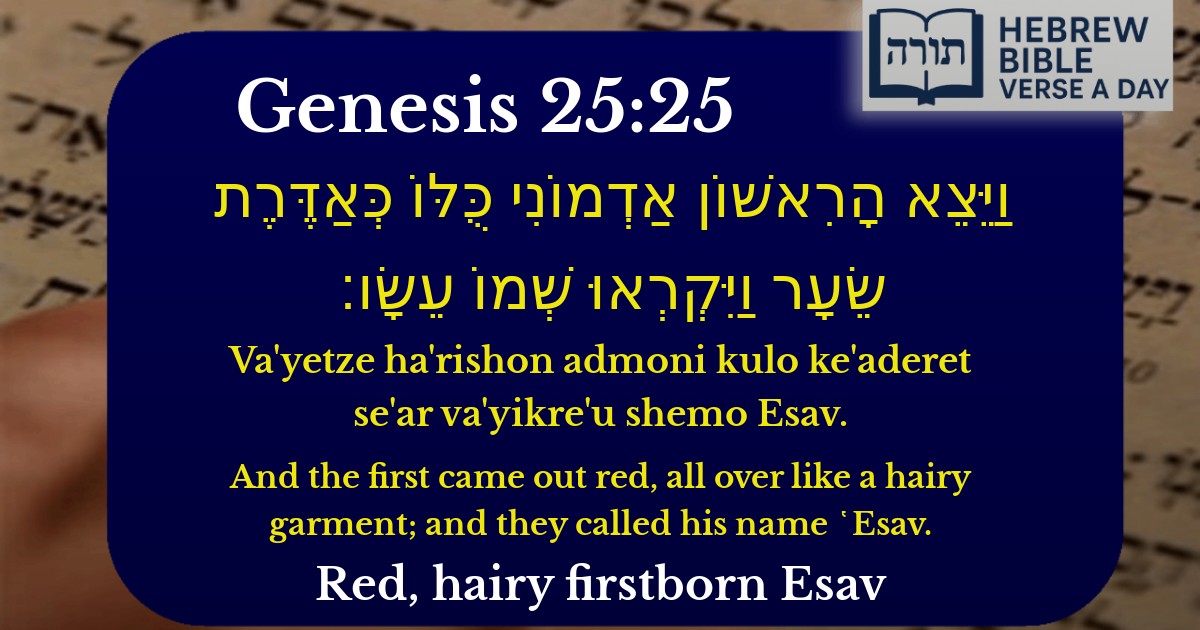Join Our Newsletter To Be Informed When New Videos Are Posted
Join the thousands of fellow Studends who rely on our videos to learn how to read the bible in Hebrew for free!
Hebrew Text
וַיֵּצֵא הָרִאשׁוֹן אַדְמוֹנִי כֻּלּוֹ כְּאַדֶּרֶת שֵׂעָר וַיִּקְרְאוּ שְׁמוֹ עֵשָׂו׃
English Translation
And the first came out red, all over like a hairy garment; and they called his name ῾Esav.
Transliteration
Va'yetze ha'rishon admoni kulo ke'aderet se'ar va'yikre'u shemo Esav.
Hebrew Leining Text
וַיֵּצֵ֤א הָרִאשׁוֹן֙ אַדְמוֹנִ֔י כֻּלּ֖וֹ כְּאַדֶּ֣רֶת שֵׂעָ֑ר וַיִּקְרְא֥וּ שְׁמ֖וֹ עֵשָֽׂו׃
וַיֵּצֵ֤א הָרִאשׁוֹן֙ אַדְמוֹנִ֔י כֻּלּ֖וֹ כְּאַדֶּ֣רֶת שֵׂעָ֑ר וַיִּקְרְא֥וּ שְׁמ֖וֹ עֵשָֽׂו׃
🎵 Listen to leining
Parasha Commentary
📚 Talmud Citations
This verse is quoted in the Talmud.
📖 Sotah 13a
The verse is referenced in a discussion about the characteristics of Esau and his descendants, highlighting his red and hairy appearance as symbolic of his nature.
📖 Niddah 31a
The verse is mentioned in a discussion about the birth of Esau and Jacob, focusing on the physical descriptions and their implications.


Physical Description of Esav
The verse describes Esav as being "red, all over like a hairy garment." Rashi explains that the redness indicates his bloodthirsty nature, as he would grow up to be a man who pursued hunting and violence (Rashi on Bereishit 25:25). The Midrash further elaborates that his redness hinted at his future inclination toward murder, as the color red is associated with bloodshed (Bereishit Rabbah 63:8).
Symbolism of the Hair
The phrase "like a hairy garment" (כְּאַדֶּרֶת שֵׂעָר) is interpreted by the Ramban (Nachmanides) as a sign of Esav's physical robustness and wild nature. The Talmud (Sotah 13a) notes that Esav was born fully developed, with hair like an adult, symbolizing his early readiness for worldly pursuits, in contrast to Yaakov, who was born smooth and spiritually inclined.
Naming of Esav
The name "Esav" (עֵשָׂו) is derived from the word "made" (עָשׂוּי), as Rashi explains, because he was fully formed at birth (Rashi on Bereishit 25:25). The Midrash Tanchuma (Toldot 3) adds that the name also alludes to his future actions, as he would "do" (עָשָׂה) deeds of wickedness, such as idolatry and immorality.
Contrast with Yaakov